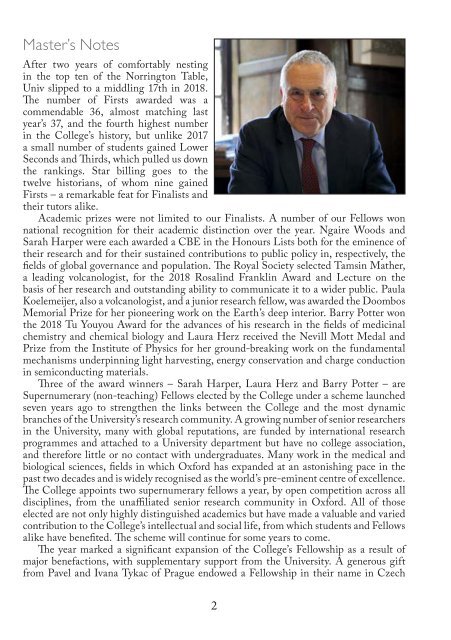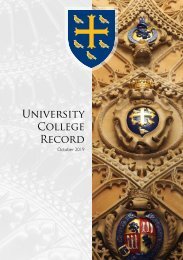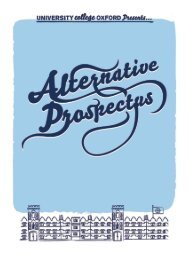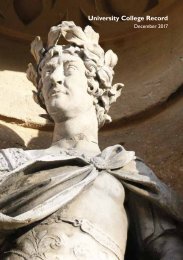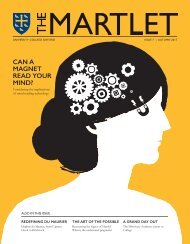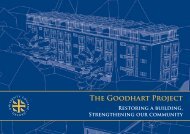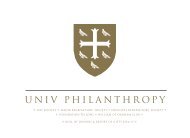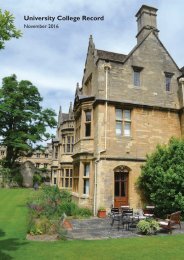Univ Record 2018
University College Oxford Record 2018
University College Oxford Record 2018
Create successful ePaper yourself
Turn your PDF publications into a flip-book with our unique Google optimized e-Paper software.
Master’s Notes<br />
After two years of comfortably nesting<br />
in the top ten of the Norrington Table,<br />
<strong>Univ</strong> slipped to a middling 17th in <strong>2018</strong>.<br />
The number of Firsts awarded was a<br />
commendable 36, almost matching last<br />
year’s 37, and the fourth highest number<br />
in the College’s history, but unlike 2017<br />
a small number of students gained Lower<br />
Seconds and Thirds, which pulled us down<br />
the rankings. Star billing goes to the<br />
twelve historians, of whom nine gained<br />
Firsts – a remarkable feat for Finalists and<br />
their tutors alike.<br />
Academic prizes were not limited to our Finalists. A number of our Fellows won<br />
national recognition for their academic distinction over the year. Ngaire Woods and<br />
Sarah Harper were each awarded a CBE in the Honours Lists both for the eminence of<br />
their research and for their sustained contributions to public policy in, respectively, the<br />
fields of global governance and population. The Royal Society selected Tamsin Mather,<br />
a leading volcanologist, for the <strong>2018</strong> Rosalind Franklin Award and Lecture on the<br />
basis of her research and outstanding ability to communicate it to a wider public. Paula<br />
Koelemeijer, also a volcanologist, and a junior research fellow, was awarded the Doombos<br />
Memorial Prize for her pioneering work on the Earth’s deep interior. Barry Potter won<br />
the <strong>2018</strong> Tu Youyou Award for the advances of his research in the fields of medicinal<br />
chemistry and chemical biology and Laura Herz received the Nevill Mott Medal and<br />
Prize from the Institute of Physics for her ground-breaking work on the fundamental<br />
mechanisms underpinning light harvesting, energy conservation and charge conduction<br />
in semiconducting materials.<br />
Three of the award winners – Sarah Harper, Laura Herz and Barry Potter – are<br />
Supernumerary (non-teaching) Fellows elected by the College under a scheme launched<br />
seven years ago to strengthen the links between the College and the most dynamic<br />
branches of the <strong>Univ</strong>ersity’s research community. A growing number of senior researchers<br />
in the <strong>Univ</strong>ersity, many with global reputations, are funded by international research<br />
programmes and attached to a <strong>Univ</strong>ersity department but have no college association,<br />
and therefore little or no contact with undergraduates. Many work in the medical and<br />
biological sciences, fields in which Oxford has expanded at an astonishing pace in the<br />
past two decades and is widely recognised as the world’s pre-eminent centre of excellence.<br />
The College appoints two supernumerary fellows a year, by open competition across all<br />
disciplines, from the unaffiliated senior research community in Oxford. All of those<br />
elected are not only highly distinguished academics but have made a valuable and varied<br />
contribution to the College’s intellectual and social life, from which students and Fellows<br />
alike have benefited. The scheme will continue for some years to come.<br />
The year marked a significant expansion of the College’s Fellowship as a result of<br />
major benefactions, with supplementary support from the <strong>Univ</strong>ersity. A generous gift<br />
from Pavel and Ivana Tykac of Prague endowed a Fellowship in their name in Czech<br />
2


